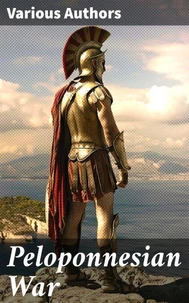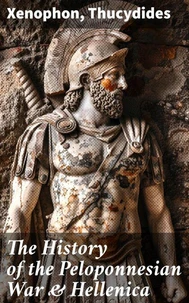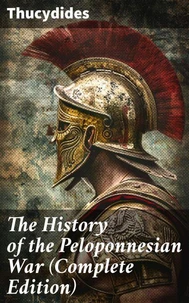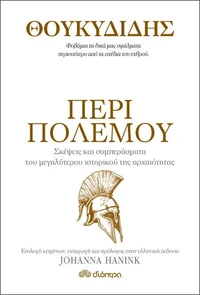The History of Peloponnesian War. According to Contemporary Historians Thucydides and Xenophon
Par : , , , ,Formats :
Disponible dans votre compte client Decitre ou Furet du Nord dès validation de votre commande. Le format ePub est :
- Compatible avec une lecture sur My Vivlio (smartphone, tablette, ordinateur)
- Compatible avec une lecture sur liseuses Vivlio
- Pour les liseuses autres que Vivlio, vous devez utiliser le logiciel Adobe Digital Edition. Non compatible avec la lecture sur les liseuses Kindle, Remarkable et Sony
 , qui est-ce ?
, qui est-ce ?Notre partenaire de plateforme de lecture numérique où vous retrouverez l'ensemble de vos ebooks gratuitement
Pour en savoir plus sur nos ebooks, consultez notre aide en ligne ici
- Nombre de pages1023
- FormatePub
- ISBN406-4-06-630897-1
- EAN4064066308971
- Date de parution17/12/2020
- Protection num.Digital Watermarking
- Taille1 Mo
- Infos supplémentairesepub
- ÉditeurMUSAICUM BOOKS
Résumé
In 'The History of Peloponnesian War, ' readers are offered a profound compilation that explores the intricate dynamics of war, politics, and human nature through the ages. This anthology melds the careful analytical prose of Thucydides with the vivid, more personalized accounts of Xenophon, complemented by the historiographical expertise of J. B. Bury. The collection spans a variety of narrative styles, from the tactical to the theoretical, framed within the broader context of classical Greek literature and its subsequent interpretations across history.
The standout pieces collectively provide a multi-dimensional perspective on one of ancient history's most significant conflicts. The contributing authors, each regarded as pillars in the study of ancient Greek history, bring a diversity of backgrounds to the anthology. Thucydides' stern realism, Xenophon's philosophical musings, and Bury's historiographical clarity collectively highlight different facets of the Peloponnesian War while being steeped in the intellectual movements of their respective eras.
This collaborative effort enriches the reader's understanding of both the historical period and its wider implications. This anthology is a treasure trove for students of history, philosophy, and literature, inviting them to a confluence of historical narrative and analysis that stimulates a deeper understanding of the Peloponnesian War and its lasting impacts on civilization. Scholars and casual readers alike will benefit from the expansive viewpoints and enduring insights provided, fostering a rich dialogue between the epoch-defining works contained within.
The standout pieces collectively provide a multi-dimensional perspective on one of ancient history's most significant conflicts. The contributing authors, each regarded as pillars in the study of ancient Greek history, bring a diversity of backgrounds to the anthology. Thucydides' stern realism, Xenophon's philosophical musings, and Bury's historiographical clarity collectively highlight different facets of the Peloponnesian War while being steeped in the intellectual movements of their respective eras.
This collaborative effort enriches the reader's understanding of both the historical period and its wider implications. This anthology is a treasure trove for students of history, philosophy, and literature, inviting them to a confluence of historical narrative and analysis that stimulates a deeper understanding of the Peloponnesian War and its lasting impacts on civilization. Scholars and casual readers alike will benefit from the expansive viewpoints and enduring insights provided, fostering a rich dialogue between the epoch-defining works contained within.
In 'The History of Peloponnesian War, ' readers are offered a profound compilation that explores the intricate dynamics of war, politics, and human nature through the ages. This anthology melds the careful analytical prose of Thucydides with the vivid, more personalized accounts of Xenophon, complemented by the historiographical expertise of J. B. Bury. The collection spans a variety of narrative styles, from the tactical to the theoretical, framed within the broader context of classical Greek literature and its subsequent interpretations across history.
The standout pieces collectively provide a multi-dimensional perspective on one of ancient history's most significant conflicts. The contributing authors, each regarded as pillars in the study of ancient Greek history, bring a diversity of backgrounds to the anthology. Thucydides' stern realism, Xenophon's philosophical musings, and Bury's historiographical clarity collectively highlight different facets of the Peloponnesian War while being steeped in the intellectual movements of their respective eras.
This collaborative effort enriches the reader's understanding of both the historical period and its wider implications. This anthology is a treasure trove for students of history, philosophy, and literature, inviting them to a confluence of historical narrative and analysis that stimulates a deeper understanding of the Peloponnesian War and its lasting impacts on civilization. Scholars and casual readers alike will benefit from the expansive viewpoints and enduring insights provided, fostering a rich dialogue between the epoch-defining works contained within.
The standout pieces collectively provide a multi-dimensional perspective on one of ancient history's most significant conflicts. The contributing authors, each regarded as pillars in the study of ancient Greek history, bring a diversity of backgrounds to the anthology. Thucydides' stern realism, Xenophon's philosophical musings, and Bury's historiographical clarity collectively highlight different facets of the Peloponnesian War while being steeped in the intellectual movements of their respective eras.
This collaborative effort enriches the reader's understanding of both the historical period and its wider implications. This anthology is a treasure trove for students of history, philosophy, and literature, inviting them to a confluence of historical narrative and analysis that stimulates a deeper understanding of the Peloponnesian War and its lasting impacts on civilization. Scholars and casual readers alike will benefit from the expansive viewpoints and enduring insights provided, fostering a rich dialogue between the epoch-defining works contained within.













